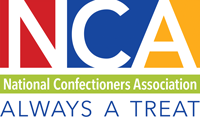History & Background
For more than thirty years, NCA has advocated for free trade, improved market access and fair competition. U.S. tariffs on finished chocolate and confectionery products are historically among the lowest in the world, and NCA continues to support an open U.S. market despite significant tariff barriers in important export markets and high domestic raw material costs as a result of protective sugar and dairy programs. Opening new markets for chocolate and confectionery is a priority for NCA as it offers great potential to enhance U.S. economic growth and create new jobs.
NCA members export nearly $2 billion in American-made chocolates and confectionery annually to consumers around the world, and top export destinations include Canada, Mexico, South Korea, Australia, the United Kingdom and Japan. U.S. imports of confectionery, chocolate and cocoa inputs are valued at nearly $4.4 billion and provide a varied selection for U.S. consumers.
NCA manages USDA’s Market Access Program for the U.S. confectionery industry which helps American companies export products to foreign markets. Given that U.S. confectionery contains commodities grown and produced in the United States, NCA is fortunate to be a cooperator in the program, representing these U.S. confectionery manufacturers. The MAP program reimburses up to 50 percent of qualifying marketing and promotional expenses including advertising, sample shipments, public relations, seminars, certain publication expenditures and many trade show-related expenses. Marketing assistance funds are available to the confectionery industry each year.
NCA continues to advance cross-border trade opportunities and works to minimize risks at national borders for its members around the world.
Trade Issues & Their Impact on the Food Industry
- NCA strongly supports the implementation of the United States-Canada-Mexico Agreement (USMCA). The North American Free Trade Agreement (NAFTA) helped shape a highly integrated supply chain in the region, and thanks in part to this relationship, nearly 60% of U.S. export sales of chocolate and confectionery are destined for Canada and Mexico. The USMCA builds on this long-standing North American trade relationship, ensures U.S. manufacturers can continue to sell their products tariff-free to consumers in both markets and eliminate red tape at the border, making it easier for small and medium-sized confectioners to extend their export sales throughout North America. The agreement is scheduled to be implemented July 1st, 2020.
- A strong trans-Atlantic trade relationship remains a top priority, and NCA supports greater market access opportunities for manufacturers and consumers in the trans-Atlantic marketplace. NCA supports a bilateral trade agreement with the EU that removes tariff and quota barriers on U.S. goods; eliminates the complex Meursing system that ratchets up tariff costs based on sugar and dairy content; addresses non-tariff barriers rooted in different regulatory approaches; and provides access to EU-refined sugar for U.S. manufacturers.
- Additionally, NCA is concerned with recent trade friction between the U.S. and the European Union, specifically disputes over aircraft subsidies that have seen retaliatory U.S. tariffs imposed on imports of sweet biscuits and waffles/wafers from the EU and threats of EU retaliatory tariffs on U.S. chocolate exports. NCA has partnered with the Association of Chocolate, Biscuit and Confectionery Industries of Europe (CAOBISCO), its counterpart in the European Union, to request the removal of NCA members’ products from retaliation lists and urge constructive engagement between the U.S. government and the European Commission to resolve these disputes without harming confectionery manufacturers.
- NCA and its members continue to engage with USTR, USDA and members of Congress to push for the elimination of high tariffs on U.S. chocolate and confectionery exports to Japan in order to ensure U.S. manufacturers can compete on a level playing field with Japan’s other free trade agreement partners.
- Trade between the U.S. and China remains an issue of concern. Like many other sectors, the confectionery industry has seen its entire portfolio of products targeted by U.S. Section 301 tariffs on imports from China as well as Chinese retaliatory tariffs on U.S. exports. NCA welcomes the de-escalatory step of the U.S. signing a Phase 1 deal with China to halt further tariff increases and reduce some U.S. Section 301 tariffs on NCA members’ goods. NCA has also supported importing members’ tariff exclusion requests and continues to engage on the importance of the growing Chinese market for U.S. exporters.
How Can You Get Involved?
- If U.S. trade policy is having a negative impact on your business, reach out to NCA to tell your story
- Contact NCA to learn more about trade issues impacting the confectionery industry
- Update your contact information so that NCA can reach you with the most up to date information.




